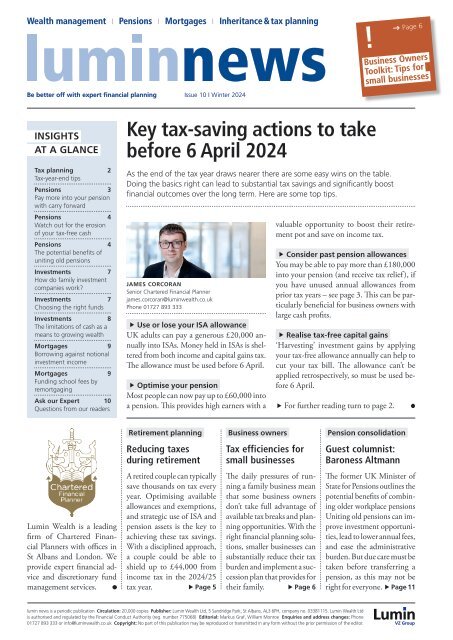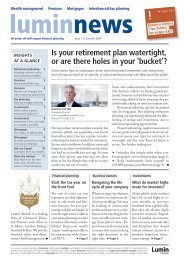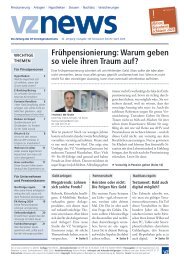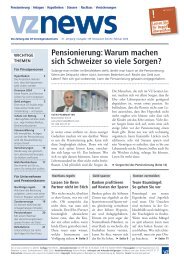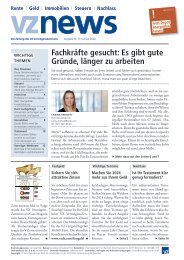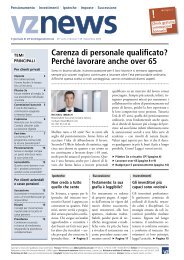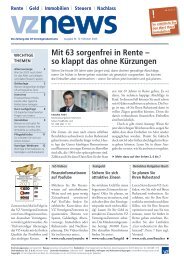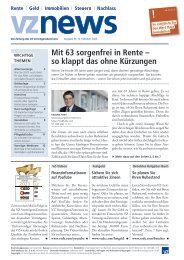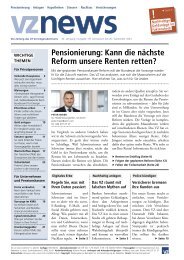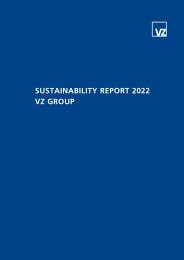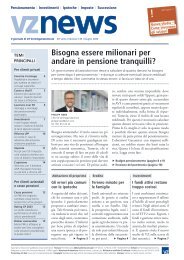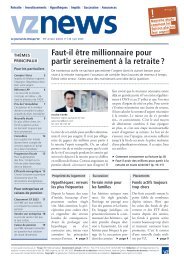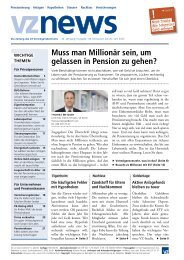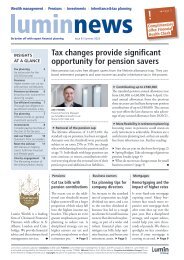lumin news Issue 10 / Winter 2024
You also want an ePaper? Increase the reach of your titles
YUMPU automatically turns print PDFs into web optimized ePapers that Google loves.
Wealth management I Pensions I Mortgages I Inheritance & tax planning<br />
Be better off with expert financial planning <strong>Issue</strong> <strong>10</strong> I <strong>Winter</strong> <strong>2024</strong><br />
!<br />
Page 6<br />
Business Owners<br />
Toolkit: Tips for<br />
small businesses<br />
INSIGHTS<br />
AT A GLANCE<br />
Tax planning 2<br />
Tax-year-end tips<br />
Pensions3<br />
Pay more into your pension<br />
with carry forward<br />
Pensions4<br />
Watch out for the erosion<br />
of your tax-free cash<br />
Pensions4<br />
The potential benefits of<br />
uniting old pensions<br />
Investments7<br />
How do family investment<br />
companies work?<br />
Investments7<br />
Choosing the right funds<br />
Investments8<br />
The limitations of cash as a<br />
means to growing wealth<br />
Mortgages9<br />
Borrowing against notional<br />
investment income<br />
Mortgages9<br />
Funding school fees by<br />
remortgaging<br />
Ask our Expert <strong>10</strong><br />
Questions from our readers<br />
Key tax-saving actions to take<br />
before 6 April <strong>2024</strong><br />
As the end of the tax year draws nearer there are some easy wins on the table.<br />
Doing the basics right can lead to substantial tax savings and significantly boost<br />
financial outcomes over the long term. Here are some top tips.<br />
JAMES CORCORAN<br />
Senior Chartered Financial Planner<br />
james.corcoran@<strong>lumin</strong>wealth.co.uk<br />
Phone 01727 893 333<br />
Use or lose your ISA allowance<br />
UK adults can pay a generous £20,000 annually<br />
into ISAs. Money held in ISAs is sheltered<br />
from both income and capital gains tax.<br />
The allowance must be used before 6 April.<br />
Optimise your pension<br />
Most people can now pay up to £60,000 into<br />
a pension. This provides high earners with a<br />
valuable opportunity to boost their retirement<br />
pot and save on income tax.<br />
Consider past pension allowances<br />
You may be able to pay more than £180,000<br />
into your pension (and receive tax relief), if<br />
you have unused annual allowances from<br />
prior tax years – see page 3. This can be particularly<br />
beneficial for business owners with<br />
large cash profits.<br />
Realise tax-free capital gains<br />
‘Harvesting’ investment gains by applying<br />
your tax-free allowance annually can help to<br />
cut your tax bill. The allowance can’t be<br />
applied retrospectively, so must be used before<br />
6 April.<br />
For further reading turn to page 2.<br />
Retirement planning<br />
Business owners<br />
Pension consolidation<br />
Reducing taxes<br />
during retirement<br />
Tax efficiencies for<br />
small businesses<br />
Guest columnist:<br />
Baroness Altmann<br />
Lumin Wealth is a leading<br />
firm of Chartered Financial<br />
Planners with offices in<br />
St Albans and London. We<br />
provide expert financial advice<br />
and discretionary fund<br />
management services.<br />
A retired couple can typically<br />
save thousands on tax every<br />
year. Optimising available<br />
allowances and exemptions,<br />
and strategic use of ISA and<br />
pension assets is the key to<br />
achieving these tax savings.<br />
With a disciplined approach,<br />
a couple could be able to<br />
shield up to £44,000 from<br />
income tax in the <strong>2024</strong>/25<br />
tax year. Page 5<br />
The daily pressures of running<br />
a family business mean<br />
that some business owners<br />
don’t take full advantage of<br />
available tax breaks and planning<br />
opportunities. With the<br />
right financial planning solutions,<br />
smaller businesses can<br />
substantially reduce their tax<br />
burden and implement a succession<br />
plan that provides for<br />
their family. Page 6<br />
The former UK Minister of<br />
State for Pensions outlines the<br />
potential benefits of combining<br />
older workplace pensions<br />
Uniting old pensions can improve<br />
investment opportunities,<br />
lead to lower annual fees,<br />
and ease the administrative<br />
burden. But due care must be<br />
taken before transferring a<br />
pension, as this may not be<br />
right for everyone. Page 11<br />
<strong>lumin</strong> <strong>news</strong> is a periodic publication Circulation: 20,000 copies Publisher: Lumin Wealth Ltd, 5 Sandridge Park, St Albans, AL3 6PH, company no. 03381115. Lumin Wealth Ltd<br />
is authorised and regulated by the Financial Conduct Authority (reg. number 775068) Editorial: Markus Graf, William Monroe Enquiries and address changes: Phone<br />
01727 893 333 or info@<strong>lumin</strong>wealth.co.uk Copyright: No part of this publication may be reproduced or transmitted in any form without the prior permission of the editor.
Page 2 <strong>lumin</strong> <strong>news</strong> <strong>10</strong> / winter <strong>2024</strong><br />
Key tips for cutting your tax bill before<br />
the end of the tax year<br />
Counter the cost of living squeeze by making full use of available annual allowances<br />
and exemptions. Substantial savings can be made by optimising pensions and ISAs,<br />
and by disciplined use of your capital gains tax exemption.<br />
PETER FLOWERS<br />
Senior Financial Consultant<br />
peter.flowers@<strong>lumin</strong>wealth.co.uk<br />
Phone 01727 893 333<br />
With inflation still high and a<br />
number of tax thresholds frozen,<br />
it’s particularly important<br />
to make full use of annual allowances<br />
and exemptions that<br />
enable you to lower your tax<br />
burden and build up wealth.<br />
This article highlights some<br />
key tips that you could consider<br />
applying before the tax<br />
year ends.<br />
Optimise your pension<br />
annual allowance<br />
Contributing to a pension<br />
plan annually can significantly<br />
reduce your taxable<br />
income. UK savers can now<br />
pay up to £60,000 into their<br />
pension annually and benefit<br />
from tax relief on these contributions,<br />
in light of the<br />
50% increase to the annual<br />
allowance as of 6 April 2023.<br />
Optimising this allowance<br />
can provide a valuable boost<br />
to your retirement pot, while<br />
lowering your tax liability.<br />
Tip: If you have unused<br />
annual allowances from the<br />
three previous tax years you<br />
may be able to contribute a<br />
larger sum via the ‘carry forward’<br />
rule. For more on carrying<br />
forward see page 3.<br />
Investment ISAs offer<br />
tax-free gains<br />
Like pensions, ISAs are one<br />
of the two main pillars of<br />
tax-efficient wealth building.<br />
Each UK adult benefits<br />
from an ISA allowance of<br />
£20,000, with any interest<br />
or gains shielded from tax.<br />
The ISA annual allowance<br />
can’t be carried over into a<br />
new tax year – can you and/<br />
or family members pay more<br />
into ISAs before 6 April?<br />
Tip: You should always<br />
look to make full use of your<br />
annual allowance if you have<br />
an investment ISA before<br />
paying into a general investment<br />
account (GIA). GIAs<br />
provide flexible access and<br />
there is no limit on contributions,<br />
but they don’t benefit<br />
from the same tax shelters.<br />
Harvesting<br />
investment gains<br />
The annual capital gains tax<br />
(CGT) exemption is £6,000.<br />
This will be halved to £3,000<br />
from April <strong>2024</strong>, which will<br />
place even more emphasis on<br />
optimising ISAs and pensions,<br />
where any investment<br />
gains are exempt from tax.<br />
However, a couple can still<br />
make substantial savings by<br />
‘harvesting’ investment gains<br />
in each tax year and applying<br />
their annual CGT exemption,<br />
rather than letting gains<br />
build up and facing a large<br />
tax charge down the line.<br />
Tip: A professional investment<br />
management team<br />
can implement annual capital<br />
gains harvesting, to ensure<br />
Don’t miss out on optimising these annual allowances before 6 April<br />
Tax wrapper/benefit<br />
Standard pension allowance 1<br />
Carry forward<br />
ISA (stocks and shares)<br />
Tax-free capital gains<br />
Annual allowance<br />
£60,000 (or <strong>10</strong>0% of earnings if lower) a year for earners<br />
(contributions for non-earners are limited to £3,600)<br />
Unused annual allowances from 3 previous tax years;<br />
carry forward from 2020/21 must be used in the 2023/24<br />
tax year<br />
£20,000 per adult; £9,000 for under-16s; allowances<br />
operate on a use it or lose it basis<br />
£6,000 capital gains tax annual exemption; operates on a<br />
use it or lose it basis. £3,000 from <strong>2024</strong>/25 tax year<br />
1 Savers are subject to a tapered (reduced) annual allowance if adjusted earnings are above £260,000<br />
GOOD TO KNOW<br />
Remember to<br />
report losses<br />
If you have incurred losses<br />
when selling individual<br />
shares or funds you can<br />
carry those losses forward<br />
to offset gains made in the<br />
future. For tax-exempt<br />
products such as ISAs and<br />
pensions this isn’t an issue,<br />
but it is for shares or funds<br />
held directly and /or in a<br />
general investment account<br />
(GIA).<br />
Your GIA provider will<br />
produce a report that will<br />
detail all gains and losses<br />
made in each tax year. By<br />
reporting these to HMRC<br />
in your annual tax return,<br />
you can potentially reduce<br />
your overall tax liability,<br />
both in that individual tax<br />
year, and then (based on<br />
current legislation) in<br />
future tax years as well.<br />
this ‘use it or lose it’ allowance<br />
is being appropriately<br />
applied before the end of<br />
each tax year.<br />
Doing the basics right<br />
in each tax year can<br />
substantially improve longterm<br />
financial outcomes and<br />
your overall retirement prospects.<br />
Find out more about<br />
planning for retirement by<br />
calling a Lumin expert on<br />
03300 564 446.<br />
FACTSHEET<br />
Tips for the end of<br />
the tax year<br />
Request this free factsheet<br />
via enclosed response card,<br />
info@<strong>lumin</strong>wealth.co.uk<br />
or call 03300 564 446
<strong>lumin</strong> <strong>news</strong> <strong>10</strong> / winter <strong>2024</strong> Page 3<br />
Last chance to use any remaining<br />
pension allowances from 2020/21<br />
MY TIP<br />
Using up unused annual allowances from previous tax years can provide a healthy<br />
boost to your pension. But any remaining annual allowance from 2020/21 must be<br />
used before 6 April, or it will be permanently lost.<br />
SARA MOORE<br />
Senior Financial Consultant<br />
sara.moore@<strong>lumin</strong>wealth.co.uk<br />
Phone 01727 893 333<br />
The standard pension allowance,<br />
the maximum amount<br />
that can be contributed into<br />
a pension and benefit from<br />
tax relief each year, increased<br />
to £60,000 in April 2023<br />
(some higher earners may<br />
face a tapered annual allowance).<br />
Certain individuals<br />
can make a larger contribution<br />
by ‘carrying forward’<br />
unused annual allowances<br />
from prior tax years. This<br />
may be particularly lucrative<br />
for small business owners.<br />
How does carry<br />
forward work?<br />
Carry forward allows eligible<br />
pension savers to pay more<br />
than the standard annual allowance<br />
(£60,000) into their<br />
pension in a given tax year.<br />
This can be achieved by carrying<br />
forward unused annual<br />
allowances from the three<br />
previous tax years. To be eligible<br />
you must first use up<br />
your annual allowance in the<br />
current tax year, before using<br />
carry forward from prior<br />
years, starting with the earliest<br />
of the three available years.<br />
Any carry forward from<br />
2020/21 must be used before<br />
the 6 April, or it will be lost.<br />
Carry forward is only available<br />
if you have been a member<br />
of a registered pension<br />
scheme in a given tax year. It<br />
isn’t available if you’ve started<br />
accessing your defined contribution<br />
pension benefits.<br />
Case study<br />
The example table below illustrates<br />
how carry forward<br />
works in practice. In this scenario,<br />
the individual could<br />
achieve income tax savings of<br />
Make substantial tax savings with carry forward<br />
Example: Taxpayer in England; £<strong>10</strong>,000 annual pension contribution by employer.<br />
Earnings<br />
Pension contributions<br />
made 1 Annual allowance<br />
remaining<br />
2020/21 £130,000 £15,000 £25,000<br />
2021/22 £140,000 £40,000 None<br />
2022/23 £150,000 £20,000 £20,000<br />
2023/24 £150,000 £30,000 £30,000 2<br />
1 Employee and employer contributions<br />
2 The pension annual allowance rose from<br />
£40,000 to £60,000 as of 6 April 2023<br />
Total: £75,000<br />
Potential income<br />
tax saving of up<br />
to £35,000<br />
up to £35,000 on a pension<br />
contribution of £75,000.<br />
Benefits for<br />
business owners<br />
Carry forward can be particularly<br />
helpful for small<br />
business owners, who can<br />
extract company profits via<br />
workplace pension contributions<br />
and boost their retirement<br />
pot, achieving substantial<br />
tax savings in the process.<br />
In contrast to personal<br />
pension contributions, tax<br />
relief-qualifying contributions<br />
via a company pension<br />
scheme are not limited to<br />
relevant UK earnings. Company<br />
pension contributions<br />
are only limited to your annual<br />
allowance, plus any<br />
available carry forward.<br />
Do you want to know<br />
how much you could<br />
pay into your pension, and<br />
how this fits within your<br />
overall financial plan? Call<br />
03300 564 446.<br />
Use it in<br />
2023/24 tax<br />
year or lose it<br />
MARTIN COTTER<br />
Managing Director of<br />
Lumin VZ Group<br />
We’re delighted that the<br />
specialist mortgage adviser<br />
Davidson Deem has recently<br />
joined the Lumin VZ family<br />
of businesses. The timing is<br />
particularly important given<br />
the explosive rise in interest<br />
rates seen over the past year,<br />
which has placed greater<br />
financial emphasis on sourcing<br />
a new mortgage deal.<br />
Davidson Deem has been<br />
providing mortgage services<br />
since 1989 and has particular<br />
expertise when it comes<br />
to advising high-net-worth<br />
individuals, including solicitors<br />
and accountants. They<br />
operate as an independent<br />
whole-of-market mortgage<br />
adviser and deliver a highly<br />
professional service, which<br />
has resulted in a loyal client<br />
following. Their 300 +, 5-star<br />
Google ratings are a testament<br />
to the consistent excellence<br />
of their services.<br />
My tip: If your existing deal<br />
is coming to an end it’s advisable<br />
to consider your options<br />
in advance. New rates can be<br />
locked in up to six months<br />
early. Sign up to our Lumin<br />
Mortgage Renewal Register,<br />
and we will be in touch to<br />
help you find the best available<br />
rate ahead of the expiration<br />
of your current mortgage<br />
deal.
Page 4 <strong>lumin</strong> <strong>news</strong> <strong>10</strong> / winter <strong>2024</strong><br />
How to avoid the sting in the tail of the<br />
new pension tax-free cash rules<br />
Savers with large pension pots could see the real value of their 25% cash lump sum<br />
undercut if they leave it intact.<br />
The lifetime allowance of<br />
£1,073,<strong>10</strong>0 – the cap on the<br />
maximum amount you could<br />
save into pensions without<br />
extra tax charges – has been<br />
scrapped (as of April 2023).<br />
While this is good <strong>news</strong> for<br />
savers with large pensions,<br />
there is a sting in the tail.<br />
The standard lump sum<br />
entitlement – which allows<br />
savers to take 25% of their<br />
pot as tax-free cash – has been<br />
frozen at £268,275, with no<br />
plans currently in place to<br />
revise this. This has created a<br />
dilemma for savers with a<br />
large pension; should they<br />
leave their 25% entitlement<br />
intact – and see its value undercut<br />
over time – or put it<br />
to work elsewhere?<br />
Watch out for the erosion of your tax-free cash entitlement<br />
Assumptions: Net investment return of 5% per annum; 2% annual inflation.<br />
Year Fund value Max tax-free cash Tax-free cash<br />
percentage<br />
Frozen threshold<br />
If your pension were to grow<br />
over time, but the tax-free<br />
lump sum stayed fixed at<br />
£268,275, the percentage of<br />
available tax-free cash would<br />
shrink significantly in comparison<br />
to the total value of<br />
your pension. This is without<br />
factoring in inflation, which<br />
will eat into the purchasing<br />
Value of cash lump<br />
sum after inflation<br />
<strong>2024</strong> £500,000 £125,000 25% £125,000<br />
2034 £814,447 £203,612 25% £167,033<br />
2044 £1,326,649 £268,275 20% £180,541<br />
2054 £2,160,971 £268,275 12% £148,<strong>10</strong>7<br />
power of your frozen tax-free<br />
cash amount over the long<br />
term – see example table.<br />
Possible solutions<br />
One option is to take the taxfree<br />
lump sum and reallocate<br />
it into different tax wrappers<br />
(although bear in mind the<br />
inheritance tax implications).<br />
UK adults have a £20,000<br />
annual ISA allowance, while<br />
£9,000 can be put into a junior<br />
ISA. Offshore bonds and<br />
onshore bonds could also be<br />
a tax-efficient investment option<br />
for some savers, although<br />
it is important to weigh up<br />
the associated risks alongside<br />
the possible benefits.<br />
Want to find out more<br />
about how to maximise<br />
the value of your pension<br />
pot? Call a Lumin consultant<br />
on 03300 564 446.<br />
Pursue your personal investment strategy by bringing<br />
pensions together in one ‘mothership’<br />
After a job move, it can be<br />
easy to forget about pension<br />
arrangements with a former<br />
employer. But it’s important<br />
to make sure the money is<br />
invested in the right asset mix<br />
and to monitor costs and performance.<br />
Having a ‘mothership’<br />
pension – outside of<br />
a workplace pension with a<br />
current employer – can make<br />
that process much easier.<br />
Setting your own<br />
investment strategy<br />
Workplace pensions typically<br />
have a limited choice of investments.<br />
You are in an investment<br />
vehicle of the pension<br />
scheme’s choosing, which is<br />
designed for the ‘average’ employee.<br />
A preferrable option is<br />
to pursue an investment strategy<br />
based on your own goals,<br />
time horizon, and attitude to<br />
risk. Consolidating multiple<br />
plans into one self-invested<br />
personal pension allows you to<br />
tailor the asset mix/selection.<br />
Are your pensions on<br />
auto pilot?<br />
Investors in ‘target date’ or<br />
‘lifestyle’ funds should be<br />
mindful of a changing asset<br />
mix. Such funds automatically<br />
reallocate from stocks<br />
towards ‘safer’ assets in the<br />
years leading up to a predetermined<br />
retirement date.<br />
However, that might not reflect<br />
your intended use of<br />
those assets or circumstances<br />
at the time.<br />
Less admin, lower fees<br />
Combining old workplace<br />
plans makes your pensions<br />
easier to manage and can lead<br />
to reduced costs, as some<br />
plans may have higher management<br />
charges. Some old<br />
plans may not offer flexi-access<br />
drawdown, which allows<br />
retirees to dip into their pension<br />
funds flexibly.<br />
Combining multiple<br />
pots into one single<br />
flexible plan can give you<br />
greater options when planning<br />
for both the short and<br />
long term. But it’s important<br />
to watch out for potential<br />
charges or any loss of benefits<br />
that would result from exiting<br />
a plan. Find out more by<br />
calling 03300 564 446.
<strong>lumin</strong> <strong>news</strong> <strong>10</strong> / winter <strong>2024</strong> Page 5<br />
How to generate retirement income with a<br />
minimal tax burden<br />
With the right planning, and careful use of allowances, a couple can significantly<br />
lighten their tax load in retirement.<br />
JOE FISHER<br />
Financial Planning Manager<br />
joe.fisher@<strong>lumin</strong>wealth.co.uk<br />
Phone 02039 887 788<br />
Most retirees are able to substantially<br />
reduce their income<br />
tax burden once they<br />
stop working. With careful<br />
management and disciplined<br />
use of allowances, a couple<br />
could be able to shield up to<br />
£44,000 from tax in the<br />
<strong>2024</strong>/25 tax year (see chart).<br />
A changing taxation<br />
picture in retirement<br />
During retirement the taxation<br />
picture undergoes a<br />
major shift for most people.<br />
Your income will drop significantly,<br />
so your tax bill will<br />
also fall. You can utilise several<br />
helpful allowances to<br />
stay within the basic rate tax<br />
band for income tax (20%),<br />
minimising your tax bill still<br />
further. In some cases, with<br />
careful planning, a retired<br />
couple could negate income<br />
tax entirely. It’s important to<br />
keep track of all forms of income.<br />
Pension withdrawals,<br />
rental income, State Pension<br />
payments and dividend income<br />
are all taxable.<br />
Making the most of<br />
tax allowances<br />
Pension withdrawals are subject<br />
to income tax at your<br />
A couple can have up to £44,000 income<br />
per year tax-free<br />
Max. tax-free income<br />
£45,000<br />
£40,000<br />
£35,000<br />
£30,000<br />
£25,000<br />
£20,000<br />
£15,000<br />
£<strong>10</strong>,000<br />
£5,000<br />
£0<br />
One person<br />
Personal allowance<br />
CGT allowance<br />
Starting rate for<br />
savings income<br />
marginal rate. But if a couple<br />
each apply their personal allowances<br />
of £12,570, over<br />
£25,000 can be taken taxfree<br />
each year. The capital<br />
gains tax annual allowance<br />
can be used to ‘harvest’ investment<br />
gains – or other<br />
taxable gains – in each tax<br />
year. This allowance is currently<br />
£6,000, but will be<br />
£3,000 per person for the<br />
<strong>2024</strong>/25 tax year.<br />
Individuals with less than<br />
£17,570 of non-savings income<br />
may be able to benefit<br />
from up to £5,000 of tax-free<br />
savings income. This allowance<br />
is known as the starting<br />
rate for savings. Every £1 of<br />
non-savings income above<br />
your personal allowance of<br />
£12,570 reduces your starting<br />
rate for savings by £1.<br />
Basic rate taxpayers who<br />
have income above £17,570<br />
can benefit from £1,000 taxfree<br />
savings interest per person<br />
each year, via the personal<br />
savings allowance.<br />
A couple<br />
Personal savings allowance<br />
Dividend allowance<br />
Cutting your dividends<br />
tax bill<br />
Investors who are earning<br />
income from dividends (on<br />
investments held outside of<br />
tax wrappers) can also take<br />
steps to reduce their tax bill.<br />
The dividend allowance of<br />
£1,000 will be cut to £500<br />
from 6 April, but a couple<br />
can still enjoy tax-free dividend<br />
income of £1,000 annually.<br />
Staying within the<br />
basic rate tax band also sees<br />
you pay tax on dividend income<br />
(above the dividend<br />
allowance) at a rate of just<br />
8.75%, rather than 33.75%<br />
and 39.35% for higher and<br />
additional rate taxpayers.<br />
ISAs and pensions<br />
ISAs and pensions form the<br />
bedrock of retirement income,<br />
but how and when<br />
should you draw on them?<br />
Many retirees make tax-free<br />
withdrawals from flexible<br />
ISAs first and save pensions<br />
for later in retirement (leaving<br />
them invested and with<br />
the opportunity for future<br />
growth), as pensions are typically<br />
exempt from forming<br />
part of the estate for inheritance<br />
tax purposes.<br />
Using ISA assets first enables<br />
you to continue Dividend making allowance<br />
pension contributions Personal of up savings allow<br />
to £60,000 in each Starting tax year. rate for savin<br />
This may be helpful if you<br />
CGT allowance<br />
are continuing to work parttime,<br />
as once you start Personal draw-allowancing<br />
from pensions you are<br />
limited to a maximum contribution<br />
of £<strong>10</strong>,000 in each<br />
tax year. You can take up to<br />
25% of your total pension<br />
pot as a tax-free cash lump<br />
sum when you start accessing<br />
pension benefits.<br />
Strategically spreading<br />
pension withdrawals (beyond<br />
the 25% tax-free lump<br />
sum) over a number of tax<br />
years can help ensure overall<br />
income stays within the basic<br />
rate tax band, rather than<br />
making a large one-off withdrawal<br />
in a given tax year,<br />
which would likely tip you<br />
into a higher tax bracket.<br />
A retired couple who<br />
are making full use of<br />
their annual allowances and<br />
exemptions can save thousands<br />
on tax each year. Learn<br />
more by calling one of the<br />
Lumin financial consultants<br />
on 03300 564 446.<br />
FACTSHEET<br />
Tax-saving tips<br />
for pensions<br />
Request this free factsheet<br />
via enclosed response card,<br />
info@<strong>lumin</strong>wealth.co.uk<br />
or call 03300 564 446
Page 6 <strong>lumin</strong> <strong>news</strong> <strong>10</strong> / winter <strong>2024</strong><br />
Financial planning for small business owners:<br />
Tips for cutting your tax bill<br />
How can family-run businesses navigate the tax maze and implement financial<br />
efficiencies, while also incorporating a robust succession plan?<br />
WILL HARRIES<br />
Financial Consultant<br />
will.harries@<strong>lumin</strong>wealth.co.uk<br />
Phone 01727 893 333<br />
With so much time spent on<br />
running the business in the<br />
day-to-day, family businesses<br />
often don’t take a step back<br />
and consider the various tax<br />
efficiencies of effective financial<br />
planning (which larger<br />
companies consistently benefit<br />
from). This article outlines<br />
some of the tax-saving<br />
measures and steps that small<br />
business owners could consider<br />
implementing.<br />
Pay structure and<br />
tax efficiency<br />
Many directors of limited<br />
companies pay themselves a<br />
small director’s salary, allowing<br />
them to build up qualifying<br />
years for their State<br />
Pension, but keep their National<br />
Insurance Contributions<br />
low. They would typically<br />
draw the rest of the<br />
Checklist for tax efficiency<br />
Pay structure<br />
Pensions<br />
Estate planning<br />
money in the form of dividends,<br />
which are paid out of<br />
a company’s profits after corporation<br />
tax has been deducted.<br />
However dividend<br />
tax rates are currently high,<br />
with higher and additional<br />
rate taxpayers paying tax at<br />
33.75% and 39.35% respectively.<br />
This approach also<br />
means your pension contributions<br />
are limited, as they<br />
can’t exceed your annual salary<br />
for the tax year.<br />
Tip: If a company is generating<br />
substantial profits<br />
then employer pension contributions<br />
can be a very taxefficient<br />
way of paying yourself,<br />
as well as family members<br />
who work with you.<br />
Making regular<br />
contributions into<br />
pensions<br />
Pension contributions made<br />
via the company (as opposed<br />
to personal contributions)<br />
can result in significant tax<br />
savings. Employer pension<br />
contributions are considered<br />
to be an allowable business<br />
expense, so they can usually<br />
be offset against corporation<br />
tax, subject to meeting the<br />
‘wholly and exclusively’ tests.<br />
Employers also don’t have to<br />
pay National Insurance on<br />
pension contributions.<br />
UK adults can now pay<br />
up to £60,000 into a pension<br />
annually, but a larger sum<br />
could be contributed if you<br />
have unused annual allowances<br />
from the previous three<br />
tax years. Paying into workplace<br />
pensions also provides<br />
a valuable financial buffer if<br />
the business were to struggle<br />
or fail, as workplace pensions<br />
do not form part of a company’s<br />
assets.<br />
Tip: If your business is<br />
generating substantial cash<br />
profits, and if adult children<br />
are also involved in running<br />
the business, they could also<br />
benefit from significant tax<br />
savings by making pension<br />
contributions via the company,<br />
while building up their<br />
own retirement pot(s).<br />
Succession planning<br />
If younger family members<br />
have the appetite – and the<br />
skills – to run the business<br />
then there are various ways<br />
to pass on a small business<br />
tax-efficiently. Gifting the<br />
• Consider the most tax-efficient way of extracting money<br />
(salary plus dividends, or pension contributions)<br />
• If paying into workplace pensions, ensure all family<br />
employees are optimising their contributions<br />
• Consider whether you can carry forward unused annual<br />
allowances<br />
• Plan early and consider the most tax-efficient way of<br />
passing on the business<br />
GOOD TO KNOW<br />
Cost-effective life<br />
insurance<br />
Many business owners opt<br />
to take out life insurance,<br />
to guard against an<br />
unexpected passing.<br />
Funding these policies via<br />
the company (rather than<br />
personally) can be very<br />
tax-efficient. This is because<br />
premiums are deductible<br />
against corporation tax, as<br />
they are considered to be<br />
an ‘allowable business<br />
expense’. Company owners<br />
can often make substantial<br />
savings as a result.<br />
business – or your shares in<br />
it – to children is one option,<br />
as after the seven-year window<br />
these assets are then<br />
outside of your estate for inheritance<br />
tax purposes.<br />
Tip: If your company<br />
qualifies for Business Relief<br />
then you may be able to pass<br />
it on to descendants without<br />
a tax charge. Early planning<br />
is advised.<br />
Financial planning can<br />
help small business<br />
owners reduce their tax burden,<br />
boost retirement outcomes<br />
and ensure the right<br />
legacy for loved ones. Call us<br />
on 03300 564 446 to discuss<br />
your options.<br />
FACTSHEET<br />
Tips on small<br />
business protection<br />
Request a free factsheet via<br />
enclosed response card,<br />
info@<strong>lumin</strong>wealth.co.uk<br />
or call the Lumin team on<br />
03300 564 446
<strong>lumin</strong> <strong>news</strong> <strong>10</strong> / winter <strong>2024</strong> Page 7<br />
Family investment companies: A tax-efficient<br />
way of building and protecting wealth<br />
For families with substantial wealth a family investment company may prove to be a<br />
valuable alternative to approaches such as a discretionary trust.<br />
A family investment company,<br />
or FIC, can offer a flexible<br />
and tax-efficient solution<br />
through which to grow and<br />
pass on wealth.<br />
A FIC is structured as a<br />
private limited company and<br />
created (often via a founder<br />
‘loan’) to hold a wide range<br />
of investments for a family,<br />
with the possibility of establishing<br />
different share classes<br />
to vary control and income<br />
opportunities. A gift of shares<br />
to children is outside the donor’s<br />
estate after seven years.<br />
In contrast, when gifting into<br />
a discretionary trust a 20%<br />
tax charge is due immediately<br />
if the gift exceeds £325,000.<br />
This rule, alongside additional<br />
tax charges that apply<br />
to discretionary trusts every<br />
<strong>10</strong> years, means that certain<br />
high-net-worth families use<br />
FICs as an alternative option<br />
to consolidate and protect<br />
family wealth, while maintaining<br />
control and providing<br />
an income (if required).<br />
Potential tax benefits<br />
Repayment of the original<br />
‘loan’ is tax-free and can be<br />
used to provide an income.<br />
Dividends declared on underlying<br />
equities held in<br />
a FIC are typically exempt<br />
from corporation tax. If held<br />
by an individual, or in trust,<br />
dividends (above the tax-free<br />
allowance) are subject to tax<br />
at 33.75% for higher rate taxpayers,<br />
or 39.35% for additional<br />
rate taxpayers. If a FIC<br />
is properly structured inheritance<br />
tax can be negated entirely,<br />
providing that the donor<br />
survives for seven years<br />
after they gift shares to their<br />
children. The cost of running<br />
the FIC is also tax deductible.<br />
Possible drawbacks<br />
Profits from the sale of investments<br />
held in a FIC are<br />
subject to corporation tax at<br />
a rate of 25% (not the lower<br />
‘small profits rate’). This is<br />
higher than the current capital<br />
gains tax rate on shares,<br />
which is 20% (although gains<br />
on investment properties are<br />
taxed at 28%). The biggest<br />
watchpoint revolves around<br />
extracting funds from the<br />
company. A distribution to a<br />
shareholder is subject to income<br />
tax. That tax liability<br />
can be managed by making<br />
more regular or smaller distributions<br />
to individuals who<br />
have limited other income<br />
(eg. children).<br />
FICs can be complicated<br />
and will not be<br />
the right solution for everyone.<br />
You should seek advice<br />
from a qualified professional<br />
to establish the best approach<br />
for your own circumstances.<br />
Please call 03300 564 446<br />
to discuss your options.<br />
Achieve your investment goals (earlier) by selecting<br />
the right funds<br />
It’s vital to invest in strong-performing<br />
funds that provide<br />
value for money. But there are<br />
over <strong>10</strong>0,000 collective investment<br />
vehicles worldwide<br />
and about 4,000 funds for sale<br />
in the UK. As a private investor,<br />
researching and selecting<br />
these funds can be difficult.<br />
A typical fund selection process<br />
Investment funds<br />
Initial screening<br />
Quantitative scoring<br />
Qualitative analysis<br />
Portfolio use/monitoring<br />
Unbiased selection<br />
The cornerstone of an unbiased<br />
approach is to choose<br />
from all available funds and<br />
not restrict yourself to certain<br />
providers or product types.<br />
Best-in-class products can<br />
either be active funds or passive<br />
vehicles. Active funds<br />
may struggle to outperform<br />
passive alternatives – which<br />
have lower fees – in some<br />
markets, but can have better<br />
chances in other sectors.<br />
Choosing the right<br />
investment funds<br />
A fund selection process usually<br />
starts with initial screening<br />
(eg. minimum fund size),<br />
before analysing historical<br />
performance over different<br />
time periods and market<br />
conditions (eg. when equity<br />
markets have gone up or<br />
down). A qualitative assessment<br />
is the most critical step<br />
to establish the likelihood of<br />
strong performance being<br />
repeated going forward. Due<br />
diligence thoroughly investigates<br />
a fund’s strategy, processes,<br />
and team. Ongoing<br />
monitoring after the selection<br />
of a fund typically incorporates<br />
measures such as<br />
monthly and quarterly performance<br />
analysis, and scrutiny<br />
of any changes to the<br />
investment process, strategy,<br />
or fund management team.<br />
Professional expertise<br />
can provide value for<br />
money and help avoid some<br />
of the potentially costly traps<br />
that private investors can fall<br />
into. Find out more by calling<br />
03300 564 446.
Page 8 <strong>lumin</strong> <strong>news</strong> <strong>10</strong> / winter <strong>2024</strong><br />
Is cash really king? Watch out for the<br />
short-term cash trap<br />
Savers are finding comfort in higher rates, but interest earned on cash is rarely sufficient<br />
to expand wealth. Investments offer greater return potential in the long run.<br />
FIONA READ<br />
Senior Financial Consultant<br />
fiona.read@<strong>lumin</strong>wealth.co.uk<br />
Phone 01727 893 333<br />
Uncomfortable losses for<br />
bond investors in 2022 and<br />
sustained volatility in the<br />
equity market could make<br />
cash a tempting proposition,<br />
especially with headline interest<br />
rates exceeding 5%.<br />
Many savers have piled large<br />
sums into savings accounts.<br />
This can make sense in the<br />
short term, but it hasn’t been<br />
successful in growing wealth<br />
over the long run.<br />
Are interest rates<br />
peaking?<br />
While cash may offer immediate<br />
comfort, high rates are<br />
likely to be temporary as they<br />
typically follow the direction<br />
of the base rate set by the<br />
Bank of England. This poses<br />
a reinvestment challenge for<br />
cash further down the line.<br />
The Bank of England is expected<br />
to lower its rate from<br />
<strong>2024</strong>. Bond funds offer potential<br />
for substantial gains<br />
in a falling rate environment.<br />
Investors need to weigh up<br />
the risks of investing in fixed<br />
income funds and /or direct<br />
bond investments. Bonds<br />
issued by the UK government<br />
(gilts) are exempt from<br />
capital gains tax.<br />
Beware of the invisible<br />
inflation tax<br />
At face value cash may appear<br />
to offer the best capital protection,<br />
but the impact of<br />
inflation is often overlooked.<br />
The purchasing power of<br />
your wealth comes from real<br />
returns, which is when you<br />
deduct inflation from the<br />
nominal return or interest.<br />
Interest rates may have soared<br />
in 2022 and 2023, but cash<br />
has historically yielded negative<br />
or minimal real returns,<br />
even over long periods – see<br />
table below.<br />
UK real returns by asset class (% p.a.) since 1899<br />
History favours<br />
investing over cash<br />
While UK equities underperformed<br />
cash in 2022, the<br />
table shows they have outperformed<br />
both cash and UK<br />
government bonds (gilts) in<br />
real terms over long periods.<br />
Holding more than an emergency<br />
cash reserve (which<br />
can be used to cover a job loss<br />
or other urgent financial issue)<br />
could be short-sighted.<br />
Savings accounts are unlikely<br />
to match the returns<br />
generated via an investment<br />
account over the long term.<br />
The longer your investment<br />
horizon, the greater your<br />
chance of succeeding with<br />
equities and other investments.<br />
Patience and discipline<br />
are key when investing,<br />
as there will be leaner years,<br />
alongside fruitful years where<br />
you harvest strong returns.<br />
The benefits of staying<br />
invested<br />
Predicting successful exit and<br />
re-entry points into the market<br />
is an immensely challenging<br />
task, even for the most<br />
sophisticated private investors.<br />
Bloomberg data shows<br />
that if an investor missed the<br />
<strong>10</strong> best days for global equities<br />
over the two-decade period<br />
from 2002 – 2022, they<br />
would have seen their annualised<br />
returns cut by over 3%<br />
per year.<br />
Long-term investors are<br />
best-served by sticking to a<br />
defined strategy, in line with<br />
the principle of ‘time in the<br />
UK 2022 <strong>10</strong> years 20 years 50 years 123* years<br />
Equities -11.5 2.6 3.8 4.5 4.8<br />
Gilts -34.0 -3.3 0.0 2.4 0.9<br />
Cash -<strong>10</strong>.9 -3.3 -1.8 0.7 0.5<br />
Source: Barclays Equity Gilt Study 2023; *denotes entire sample<br />
OFFER<br />
Are your investments<br />
working<br />
hard enough?<br />
A second opinion from a<br />
professional can make sure<br />
that your investment plan<br />
is in the best possible<br />
shape. A portfolio check<br />
systematically investigates<br />
key aspects, such as:<br />
• Does your long-term<br />
investment strategy and<br />
goals match with your<br />
circumstances?<br />
• Has your asset mix drifted<br />
with market movements?<br />
• Are your investment<br />
risks reduced through<br />
diversification?<br />
• Are you holding too<br />
much cash?<br />
• Which funds have performed<br />
well, and which<br />
have lagged behind?<br />
• Do you have excessive<br />
exposure to single company<br />
shares?<br />
• Are excessive fees undercutting<br />
overall returns?<br />
A second opinion from<br />
Lumin is complimentary and<br />
without any obligation to<br />
work together afterwards.<br />
Call 03300 564 446, or<br />
scan the QR code<br />
to request a<br />
portfolio check.<br />
market’, rather than ‘timing<br />
the market’.<br />
Cash is designed to fulfil<br />
shorter-term needs.<br />
Any money set aside for the<br />
long term can expect a superior<br />
return over time if it’s invested<br />
in more suitable longterm<br />
assets. Call 03300 564<br />
446 to learn more.
<strong>lumin</strong> <strong>news</strong> <strong>10</strong> / winter <strong>2024</strong> Page 9<br />
You don’t have to sell investments<br />
to fund a property purchase<br />
Certain lenders lend against notional investment income/values, allowing you to keep<br />
investments intact, while helping children or grandchildren onto the property ladder.<br />
Affordability can often be an<br />
issue for investors who are<br />
seeking to fund a house purchase.<br />
But certain lenders will<br />
lend against the value of existing<br />
investments, or the value<br />
of future investment income<br />
that could be generated. In this<br />
scenario the property is the<br />
security, rather than the investment<br />
portfolio. This notional<br />
investment ‘income’ can<br />
help borrowers to bridge the<br />
income gap and get a loan.<br />
Advantages<br />
This can be an ideal solution<br />
for helping children and /or<br />
grandchildren onto the property<br />
ladder. It allows you to<br />
keep investments where they<br />
are, and benefit from potential<br />
returns, rather than selling<br />
off a portion of your assets<br />
to help fund a house<br />
purchase. Some lenders will<br />
lend well past retirement age,<br />
providing additional flexibility<br />
for those at later life stages.<br />
How does it work?<br />
Each lender’s terms will vary.<br />
Some may use a notional<br />
amount – for example 5% of<br />
the investment value – as income,<br />
irrespective of whether<br />
your investments are returning<br />
that amount annually, or<br />
being drawn. In the example<br />
(right) an 80% value is applied<br />
to investments worth<br />
£1,000,000, with the notional<br />
annual income value<br />
ranging from £25,000 to<br />
£80,000 depending on the<br />
lender and borrower’s age.<br />
Potential limitations<br />
Each lender will have different<br />
requirements, but typical<br />
caveats to consider include<br />
term lengths, which can be<br />
limited to a set maximum<br />
term. Lenders may also require<br />
a substantial minimum<br />
investment value. In certain<br />
cases this could be upwards<br />
of £250,000. Certain higher-risk<br />
funds or products may<br />
be discounted.<br />
Mortgage<br />
affordability with<br />
investment income<br />
Illustrative example<br />
£1,000,000<br />
£800,000<br />
£600,000<br />
£400,000<br />
£200,000<br />
£0<br />
Investment portfolio<br />
Notional income value 1<br />
1 £25,000 – £80,000; notional<br />
income value depends on the<br />
lender and the borrower’s age.<br />
If you would like to<br />
find out more about<br />
borrowing with investments<br />
please get in touch with our<br />
in-house mortgage experts<br />
on 03300 564 446.<br />
orange<br />
blau<br />
Funding the cost of school fees by remortgaging<br />
Over the past few years we<br />
have seen an increasing number<br />
of borrowers look to raise<br />
funds against their homes in<br />
order to pay school fees. This<br />
trend comes as the cost of<br />
private education has continued<br />
to rise.<br />
Funding the cost of<br />
private education<br />
Typically this is done by remortgaging<br />
and borrowing a<br />
larger sum (although occasionally<br />
taking out a second<br />
mortgage may be an appropriate<br />
solution). Often the<br />
amount raised can cover expected<br />
costs right up until<br />
the last child in the family<br />
leaves higher education. This<br />
can provide a valuable revenue<br />
stream to cover fees and<br />
help with affordability.<br />
Lender problems when<br />
remortgaging<br />
A specialist mortgage broker<br />
can provide access to lenders<br />
who will ignore the school fee<br />
commitment, in the knowledge<br />
that the capital raised is<br />
specifically for covering this<br />
expense. In many cases lenders<br />
count the school fees cost<br />
as an additional financial<br />
commitment, on top of the<br />
cost of the increased mortgage.<br />
This could mean that<br />
borrowers fail to meet a lender’s<br />
affordability criteria in<br />
some cases.<br />
Offset mortgages<br />
Some schools may offer a<br />
discount on the total cost if<br />
you pay the whole sum up<br />
front. If parents prefer to<br />
hold back the funds and pay<br />
school fees on a termly basis,<br />
remortgaging via an offset<br />
mortgage may be an appropriate<br />
solution. With an offset<br />
mortgage funds can be<br />
drawn as and when they are<br />
required. This provides flexibility<br />
and can be cost-effective,<br />
as interest is effectively<br />
only charged as and when the<br />
funds are spent.<br />
While offset mortgages<br />
provide valuable flexibility,<br />
interest rates can often be<br />
higher than for traditional<br />
mortgages. A specialist broker<br />
can help you find the best<br />
deal for your circumstances.<br />
Our independent inhouse<br />
mortgage experts<br />
have access to exclusive<br />
lender deals and provide a<br />
‘whole-of-market’ brokering<br />
service that covers all types of<br />
property finance, including<br />
offset mortgages. Call 03300<br />
564 446 to find out more.<br />
Important: It’s necessary to<br />
think carefully before securing<br />
other debts against your<br />
home. Your home may be<br />
repossessed if you don’t keep<br />
up with repayments on your<br />
mortgage.
Page <strong>10</strong> <strong>lumin</strong> <strong>news</strong> <strong>10</strong> / winter <strong>2024</strong><br />
Ask our Expert<br />
Your financial planning questions answered<br />
Financial Planning Manager Jason Coppard answers readers’ questions on<br />
making the most of general investment accounts, inheritance tax refunds<br />
on investment portfolios, and investing during retirement.<br />
JASON COPPARD<br />
Financial Planning Manager<br />
jason.coppard@<strong>lumin</strong>wealth.co.uk<br />
How can I optimise my general investment<br />
account (GIA)?<br />
General investment accounts, or GIAs,<br />
do not benefit from the same tax advantages<br />
as ISAs, so capital gains tax<br />
and income tax may be incurred. However,<br />
working closely with a financial<br />
adviser can help to minimise any potential<br />
tax bill. For example, funds can<br />
be sold down annually from GIAs and<br />
transferred across to other tax-efficient<br />
products, such as ISAs and pensions.<br />
Which funds to sell – and the timing<br />
around this – is very important.<br />
If you are going to invest in GIAs it<br />
is important to optimise the tax-free<br />
capital gains allowance in each tax year.<br />
This is £6,000 for the 2023/24 tax year,<br />
and is set to fall to £3,000 in April <strong>2024</strong>.<br />
This allowance operates on a ‘use it or<br />
lose it’ basis, which means it can’t be<br />
applied retrospectively.<br />
It very much depends on what you are<br />
hoping to achieve. Many people in their<br />
60s can underestimate their investment<br />
timeline, and you may have decades of<br />
investing left ahead of you. Your appetite<br />
for risk is one of the key factors that<br />
will determine what balance of assets<br />
you hold – eg. shares vs. bonds.<br />
You may also have specific goals<br />
that mean you wish to take on more<br />
investment risk, with the aim of generating<br />
higher returns. This could include<br />
a desire to leave a larger legacy for loved<br />
ones, to maintain a certain standard of<br />
living in retirement, or to attempt to<br />
achieve inflation-beating returns.<br />
Tip: Utilising the annual exempt<br />
amount in each tax year – a process<br />
known as capital gains harvesting – can<br />
lead to significant tax savings, in contrast<br />
to deferring capital gains and being<br />
hit with a hefty tax bill when you<br />
sell the funds in the future. The annual<br />
allowance may be less generous currently<br />
in light of recent tax changes, but<br />
using it in a disciplined fashioned can<br />
still substantially reduce tax liabilities<br />
on GIAs.<br />
FACTSHEET<br />
Top tips on capital<br />
gains tax<br />
Request a factsheet via the response<br />
card, info@<strong>lumin</strong>wealth.co.uk or call<br />
the Lumin team on 03300 564 446<br />
I’m 60 and retired – what balance of growth<br />
and income assets would you recommend?<br />
Others may wish to adopt a more<br />
conservative strategy in line with their<br />
appetite for risk and retirement goals.<br />
Investing comes with inevitable ups<br />
and downs, and a long-term time horizon<br />
– typically at least five years, but<br />
ideally <strong>10</strong>-plus – is required. Time in<br />
the market, as opposed to timing the<br />
market, is an important principle.<br />
Tip: It’s important to monitor your<br />
investment goals and strategy and stick<br />
to a long-term plan. Many retirees opt<br />
to delegate investment decisions to an<br />
experienced investment management<br />
team, so they can spend more time on<br />
enjoying their retirement. <br />
Can I claim an inheritance<br />
tax refund on an<br />
investment portfolio?<br />
Inheritance tax (IHT) overpayments<br />
typically happen because families have<br />
a six-month window in which to pay<br />
any tax that is due on an estate. However,<br />
the sale of investment portfolios<br />
(or inherited properties) at later dates<br />
after this six-month window means<br />
their price valuations can often fall,<br />
compared to the valuations they were<br />
given at the time of death (additional<br />
IHT is not due if shares or property rise<br />
in value). If you wish to make a claim<br />
on investment assets you have up to a<br />
year to make a claim (for homes a fouryear<br />
period applies).<br />
When the actual value of inherited<br />
assets is settled, many families are completely<br />
unaware that they may be eligible<br />
to claim rebates on overpaid IHT.<br />
Changes in stock markets mean that an<br />
increasing number of people may be<br />
able to make a claim. This may also be<br />
the case for inheritance tax paid on a<br />
family home, if house prices were to fall.<br />
Tip: To make a claim for overpaid<br />
IHT on shares /investments it’s necessary<br />
to fill out an IHT35 form, or an<br />
IHT38 form for properties. Forms are<br />
typically filled in by the executor of the<br />
will, or an ‘administrator’ in the event<br />
that no will has been made.<br />
FACTSHEET<br />
Top tips on IHT/<br />
estate planning<br />
Request a free factsheet via<br />
the enclosed response card,<br />
info@<strong>lumin</strong>wealth.co.uk or call<br />
the Lumin team on 03300 564 446
<strong>lumin</strong> <strong>news</strong> <strong>10</strong> / winter <strong>2024</strong> Page 11<br />
OPINIONS<br />
Guest column:<br />
Baroness<br />
Ros Altmann<br />
Former Pensions Minister and consumer champion<br />
Ros Altmann outlines the potential benefits of combining<br />
multiple workplace pension plans.<br />
What are the possible benefits of<br />
bringing defined contribution pensions<br />
together?<br />
Combining several smaller defined<br />
contribution pensions into one larger<br />
fund can lead to lower annual fees, so<br />
you can keep more of the investment<br />
returns. Even small reductions in the<br />
amount you pay a company or adviser<br />
annually can make a significant difference<br />
over time.<br />
Joining different pension funds together<br />
means you can select the company<br />
you feel offers the best value. For<br />
example, the best range of investment<br />
options to match your goals, the ability<br />
to easily see how your pension is performing,<br />
reasonable costs of holding /<br />
managing your fund, and high-quality<br />
information, guidance or advice. This<br />
way, you can put your money somewhere<br />
that suits your needs and build a<br />
better pension fund for the long term.<br />
Why is caution warranted before<br />
transferring a pension?<br />
Although there are many advantages<br />
to combining your past workplace<br />
pensions, there are several reasons why<br />
this might not be right for everyone.<br />
Some past pensions have valuable guarantees<br />
– such as minimum returns, guaranteed<br />
annuity rates, or a lower minimum<br />
age of withdrawal. These benefits<br />
should not be given up lightly. Certain<br />
providers may also charge exit fees.<br />
Older pensions are more likely to have<br />
some of these features. You should really<br />
get advice before moving your fund.<br />
Is it worth retaining smaller pots?<br />
It is definitely worth considering<br />
keeping small pension pots (worth less<br />
than £<strong>10</strong>,000) that you have. You are<br />
able to cash in up to three small pots,<br />
without losing the full £60,000 annual<br />
pension contribution allowance. If you<br />
only have one non-small fund, and you<br />
have taken out more than your 25%<br />
tax-free cash entitlement, you can’t contribute<br />
more than £<strong>10</strong>,000 per year into<br />
a pension.<br />
What should you be mindful of if<br />
you’re invested in a ‘default’ workplace<br />
pension fund?<br />
‘Default’ workplace pension funds<br />
are designed for an ‘average’ person, so<br />
may not cater to your individual requirements.<br />
Your own needs depend on<br />
factors such as how long you intend to<br />
keep working, when (and if) you plan<br />
to start with drawing money, your health<br />
and age, and any other pensions you<br />
may have (eg. defined benefit pensions<br />
and the State Pension). Default funds<br />
often assume a pre-determined retirement<br />
age and will usually reallocate<br />
towards ‘safer’ assets, such as bonds, in<br />
your fifties, which reduce expected<br />
long-term returns. If you intend to carry<br />
on working, and want to keep your<br />
money invested for longer, you run the<br />
risk that your pension will deliver<br />
sub-optimal investment returns.<br />
What investment opportunities can<br />
combining multiple pots provide?<br />
Uniting multiple pension pots allows<br />
you to invest in a range of assets,<br />
which can help to smooth out investment<br />
returns over time. This diversification<br />
could deliver higher returns too,<br />
as you can reap potential rewards from<br />
allocating towards less mainstream markets.<br />
A larger fund simplifies the monitoring<br />
/administration process, particularly<br />
if the funds are managed according<br />
to one master in vestment plan that suits<br />
your needs.<br />
ROS ALTMANN<br />
Baroness Altmann is an awardwinning<br />
expert on all aspects<br />
of pensions and later life policy.<br />
She is a consumer cham pion,<br />
and was awarded a CBE in 2014<br />
for services to pensioners and<br />
pension provision. She served as<br />
UK Minister of State for Pensions<br />
from 2015 to 2016.
Page 12 | winter <strong>2024</strong><br />
Pensions, investing, and tax:<br />
Lumin experts in the media<br />
Our financial consultants regularly appear in publications including The Telegraph,<br />
MoneyWeek and Investors’ Chronicle. Here we round up some recent coverage.<br />
‘Deferring your State<br />
Pension can give you<br />
higher payments – but<br />
there’s a catch’<br />
The Telegraph, 08.06.2023<br />
Financial Planning Manager<br />
Jason Coppard says that deferring<br />
the State Pension is<br />
“unlikely to be the appropriate<br />
starting position for the<br />
majority, as retiring from<br />
work will have caused a significant<br />
reduction in regular<br />
income, and many have major<br />
concerns about living past<br />
the age of 81” (the ‘breakeven<br />
point’ whereby there is a financial<br />
benefit to deferring).<br />
There are some circumstances<br />
where it may be appropriate.<br />
For example, if your income<br />
tax status is expected to<br />
change from the time of deferral<br />
to the commencement<br />
of State Pension payments.<br />
‘Should you invest<br />
for income or growth<br />
in retirement?’<br />
Investors’ Chronicle,<br />
<strong>10</strong>.11.2023<br />
Your investment strategy in<br />
retirement will depend on<br />
several factors including your<br />
age, attitude to risk, and your<br />
financial and lifestyle goals.<br />
James Corcoran, who is a<br />
Senior Chartered Financial<br />
Planner, points out that typically<br />
“growth assets are the<br />
key element of any retirement<br />
plan, as it is primarily<br />
growth assets that will provide<br />
that driving force to<br />
stave off the erosive effects of<br />
inflation”. As James notes,<br />
this is more important now<br />
than ever, with the rate of<br />
inflation still well above the<br />
Bank of England’s long-term<br />
2% target.<br />
‘How to lower your<br />
capital gains tax bill’<br />
MoneyWeek, 03.11.2023<br />
Transferring assets between<br />
spouses is a widely used solution<br />
to limit a capital gains<br />
tax liability. Jason Coppard<br />
explains that an additional<br />
benefit can be achieved when<br />
a transfer involves charitable<br />
giving. “Transferring the asset<br />
to the individual in the higher<br />
tax band before gifting, via<br />
Gift Aid, can be worth 20%<br />
or 25% in additional rate tax<br />
relief. This is because tax<br />
bands are extended by the<br />
gross charitable donation,<br />
increasing the segment of income<br />
taxed at the lower rates.<br />
This is even more valuable if<br />
income is between £<strong>10</strong>0,000<br />
and £125,140, as it will restore<br />
some, or all, of their taxfree<br />
personal allowance.”<br />
NEWSLETTER<br />
SIGN UP<br />
Stay informed via email,<br />
receive insights on:<br />
− Pensions & retirement<br />
− Investments<br />
− Inheritance planning<br />
− Taxation<br />
− Protecting family<br />
and business<br />
Return the enclosed reply<br />
card or sign up online:<br />
www.<strong>lumin</strong>wealth.co.uk/<br />
<strong>news</strong>letter<br />
BESPOKE WEALTH<br />
MANAGEMENT<br />
Our cost-effective services<br />
cater towards clients<br />
with £<strong>10</strong>0,000 or more<br />
of investable assets.<br />
Whether you’re looking to<br />
maximise a retirement<br />
pot or seeking a professional<br />
partner to oversee and<br />
manage your investments,<br />
our integrated investment<br />
management and financial<br />
advice services can help<br />
you achieve your financial<br />
and lifestyle goals.<br />
ABOUT LUMIN WEALTH<br />
For growing, managing or protecting wealth,<br />
you are in expert hands with Lumin.<br />
You can count on our expertise in:<br />
Lumin Wealth<br />
St Albans Office<br />
5 Sandridge Park<br />
Porters Wood<br />
St Albans, AL3 6PH<br />
Phone 01727 893 333<br />
info@<strong>lumin</strong>wealth.co.uk<br />
www.<strong>lumin</strong>wealth.co.uk<br />
London Office<br />
Cornwell House<br />
21 Clerkenwell Green<br />
London, EC1R 0DX<br />
Phone 02039 887 788<br />
• Pensions & retirement<br />
• Inheritance & tax planning<br />
• Investments<br />
• Protecting family & business<br />
• Cashflow planning<br />
• Financial planning for<br />
business owners<br />
• Mortgages<br />
Advice made easy: Scan the<br />
QR code to arrange an initial<br />
meeting over a coffee.<br />
Our content constitutes a ‘financial promotion’ for the purposes of section 21 Financial Services and Markets Act 2000 (United Kingdom) (‘FSMA’). This publication is for general information only. It does not constitute<br />
advice or (by itself), a basis for any financial decision. You should only make such decisions based on your individual circumstances and, we recommend, with advice from suitably qualified advisers working for a regulated<br />
firm. Whilst we try to be accurate, Lumin Wealth does not accept responsibility for any inaccuracies in this publication or for any loss that may result from reliance on it, but this disclaimer does not affect our<br />
responsibilities or your rights under the FSMA or other applicable UK law and regulation. Any financial projections in this document are provided for illustrative purposes only and should not be regarded as predictions.<br />
Past performance is not a guide to future returns. The value of investments may fall as well as rise and you may get back less than you invested. Tax treatment depends on your individual circumstances and rules may<br />
change. The Financial Conduct Authority does not regulate tax and estate planning.


